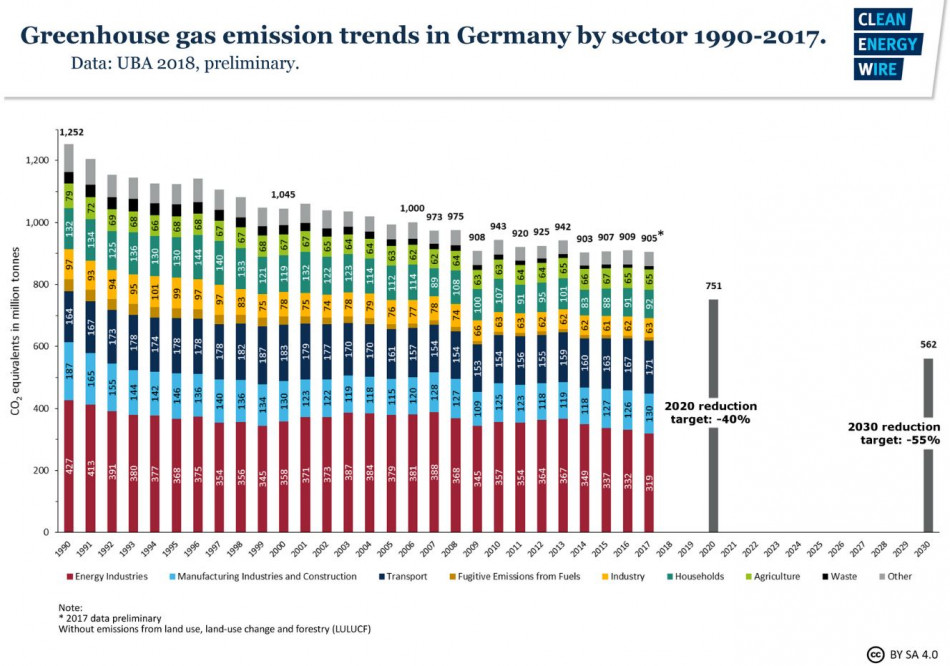Germany on track to widely miss 2020 climate target – government
Germany is on course to miss its target of cutting greenhouse gas emissions by a wide margin, according to new government estimates.
“It is to be expected that greenhouse gas emissions will decrease by around 32 percent by 2020 compared to 1990 with the measures implemented to date. This will lead to a gap of about 8 [percentage points],” says the Climate Protection Report approved by the cabinet on 13 June and previously seen by the Clean Energy Wire.
In 2014, the government initiated a "Climate Action Programme". But the additional policies were not enough to close the gap to the 2020 goal of cutting emissions by 40 percent, due to “surprisingly strong economic development and the surprisingly strong population growth,” writes the government in the report, which is due to be published following a cabinet meeting on 13 June.
The report even warns that its emission forecasts “must be considered rather optimistic in light of the current climate protection trends.”
The world’s fourth largest economy has made climate protection one of the priorities in its Energiewende, a dual shift from fossil fuels and nuclear power to a renewables-based energy system. But greenhouse gas emissions have remained stubbornly high. In recent years, Germany has barely made any progress in lowering its CO2 output. [See the article Energy sector drives slight drop in German emissions in 2017]
The Organisation for Economic Co-operation and Development (OECD), a global organisation of 35 developed and emerging countries, urged Germany to adopt further measures to reach climate targets.
“Additional policies are needed to meet even the near-term targets,” the OECD said in an Economic Survey on Germany. “It is important to meet targets on time as the credibility of climate policy is critical in view of the long-term nature of the climate challenge."
Transport lag
The report says strong economic growth and the refugee crisis are largely to blame for the fact that emissions are not decreasing as fast as previously expected, but critics have been quick to point out that the government’s inaction was also to blame.
“The changes in population size and economic growth are of great importance. The economic growth assumed in the projections was overridden by real developments between 2015 and 2017,” the report says, adding that population growth will exceed projections by one to 1.8 million people by 2020. This is mainly due to Germany’s massive intake of refugees from Syria.
Among economic sectors, the power sector’s emissions reduction will be the largest “by far,” according to the report. Second comes industry, followed by private households and services. The transport sector is lagging behind, and will only achieve “minor emissions reductions” at best, warns the report.
Transport is the only sector in Germany that has not made any progress in reducing emissions at all since 1990, the reference year for emissions. Due to the slow roll-out of low-emission vehicles, the sector is highly unlikely to catch up quickly.
The OECD criticised in its report that Germany "lacks an overarching policy strategy" for transportation.
Coal conundrum
Green Party co-head Annalena Baerbock told the Clean Energy Wire that the report "documents the political standstill" of the governing grand coalition, and called on the new coal exit commission to initiate the quick shutdown of coal power plants.
Most experts agree that Germany’s only option to drastically cut its emissions in the short term is to shut down its dirtiest lignite-fired power plants. During the first week of June, the country officially launched a coal exit task force that is tasked with sketching out Germany’s path toward phasing out the climate-damaging fossil fuel. [See the article Germany starts coal exit talks in bid to improve patchy climate record, and the factsheet Germany’s coal exit commission]
The OECD also threw its weight behind a rapid coal exit. “Phasing out coal-fired energy generation has among the lowest CO2 emission abatement costs and would enable Germany to meet its 2020 target."
Despite the drop in emissions in the power sector, coal-fired power generation remains the country’s single largest source of carbon emissions. The world’s fourth largest economy has been successful in rolling out renewables, which already cover more than a third of its electricity needs.
The so-called coal commission is supposed to make recommendations for closing the gap to Germany’s 2020 climate target “as much as possible” before the COP24 meeting in Poland in early December.
Given the official target of cutting emissions by 40 percent, the environment ministry had already warned in October in an internal paper that a failure of this magnitude would constitute a “significant blow to Germany’s climate policy,” and would be “a disaster for Germany’s international reputation as a climate leader.” [See the article Germany set to widely miss climate targets, env ministry warns.]
The think tank Agora Energiewende* had already warned in early September that Germany must step up its CO2 reduction efforts without delay if it wants to prevent a spectacular miss of its 2020 climate targets. According to the think tank’s calculations, the country’s emissions might even fall as little as 30 percent.
At the time, the environment ministry said that it did not share the think tank’s “extremely negative” assessment.
*Like the Clean Energy Wire, Agora Energiewende is a project funded by Stiftung Mercator and the European Climate Foundation.


